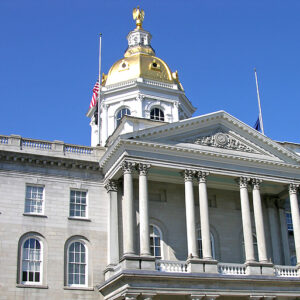Protecting New Hampshire’s GOP State House majority is a priority for a key Republican organization, and on Tuesday, it announced it’s putting its money where the math is.
The Republican State Leadership Committee revealed a $38 million effort to protect majorities in several state legislatures, with New Hampshire on the shortlist.
“We are clearly a battleground state,” New Hampshire Republican Party Chairman Chris Ager told NHJournal.
In a memo RSLC President Dee Duncan noted Republicans have held more majorities in the nation’s 50 state legislatures than Democrats since 2010. However, Duncan warned the GOP advantage could be in danger this fall as “a mere 33 seats stand in the way of Democrats flipping the five [state] chambers.”
New Hampshire House Majority Leader Jason Osborne (R-Auburn) made the case to NHJournal that “nationally-focused entities see the importance of the red oasis provided by New Hampshire within the blue sea of the northeast.” New Hampshire is the only East Coast state north of South Carolina where Republicans control the governor’s office and both chambers of the legislature.
The news comes on the heels of the National Republican Congressional Committee adding New Hampshire’s Second Congressional District to its target list. Incumbent Democrat U.S. Rep. Annie Kuster announced she won’t be seeking another term.
Meanwhile, Republicans nationwide currently hold the majority in a combined 57 state House of Representatives and Senate chambers compared to 41 for Democrats. While that advantage looks beneficial to the GOP on paper, their majorities have taken a hit in recent years. Ahead of the 2018 election cycle, Republicans claimed majorities in 65 chambers, while prior to the 2016 presidential election year, the GOP controlled 68 chambers.
In New Hampshire, Republicans currently hold a 14-10 majority in the Senate — an advantage that could shift leftward given current Senate President Jeb Bradley’s (R-Wolfeboro) decision not to seek another term — and a slim 200-193 majority in the House, according to the state’s online roster.
The New Hampshire House, currently overseen by Speaker Sherm Packard (R-Londonderry), is effectively a “toss-up” ahead of November according to Granite State political pundits.
Duncan specifically named New Hampshire as one of the five state legislatures — which also include Arizona, Pennsylvania, Wisconsin, and George — deserving of the organization’s “majority to defend” status.
That means Granite Staters can expect funding for ads, signs, and other promotional materials backing state GOP incumbents and candidates leading up to November.
The Democratic Legislative Campaign Committee, however, also announced this week it will be spending $10 million this summer on down-ballot races as part of a $60 million overall state-focused spending goal.
The DLCC lists New Hampshire as one of eight states slated for priority funding, along with Pennsylvania, Michigan, Arizona, Wisconsin, North Carolina, Kansas, and Minnesota.
“They apparently (Democrats) smell blood in the water,” one party insider told NHJournal off-the-record, while also adding that the party’s post-primary gubernatorial nominee (either former Manchester Mayor Joyce Craig or Executive Councilor Cinde Warmington) could be a boon for Democrats on the bottom of the ticket if either can gain traction after September’s primary.
Osborne told NHJournal the other side is misreading the electorate.
“When Republicans hold the majority in New Hampshire, we shine as a beacon of liberty for the rest of the country to emulate,” he said.
In March, New Hampshire Democrats claimed two House seats in special elections, while Republicans secured the same number on the day of the state’s presidential primary (Jan. 23) in red-leaning Coos County.
In February, Meredith state Rep. Matthew Coker switched parties from Democrat to Republican.
There are currently two independent House lawmakers — state Rep. Maria Perez (Milford) and state Rep. Shaun Filiault (Keene).
Asked about the DLCC’s planned $60 million spending spree highlighting New Hampshire as one of eight targeted states, Ager told NHJournal he’s confident that voters will ensure the status quo.
“They [voters] know we can’t afford Democrat control of the State House,” Ager said. “The New Hampshire advantage would be extinguished by their income tax appetite.”
Added Osborne, “Democrats cannot stand for there to remain even a sliver of freedom to exist in contrast to the vast destruction unleashed by their radical socialist policies.”





